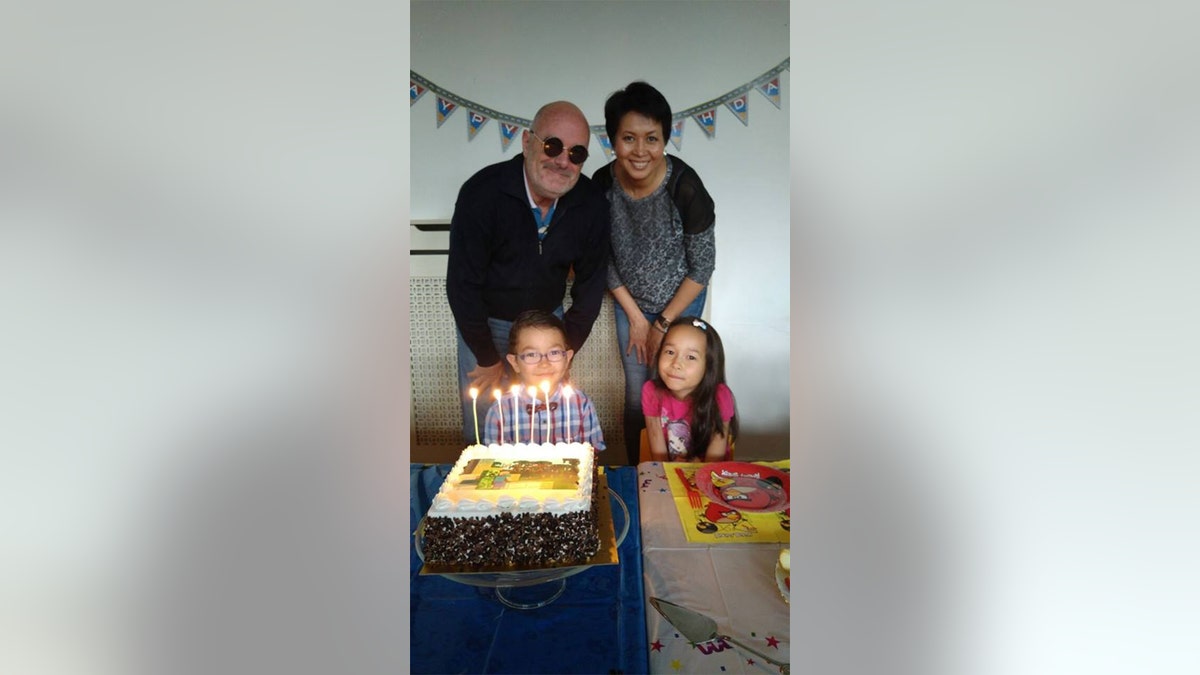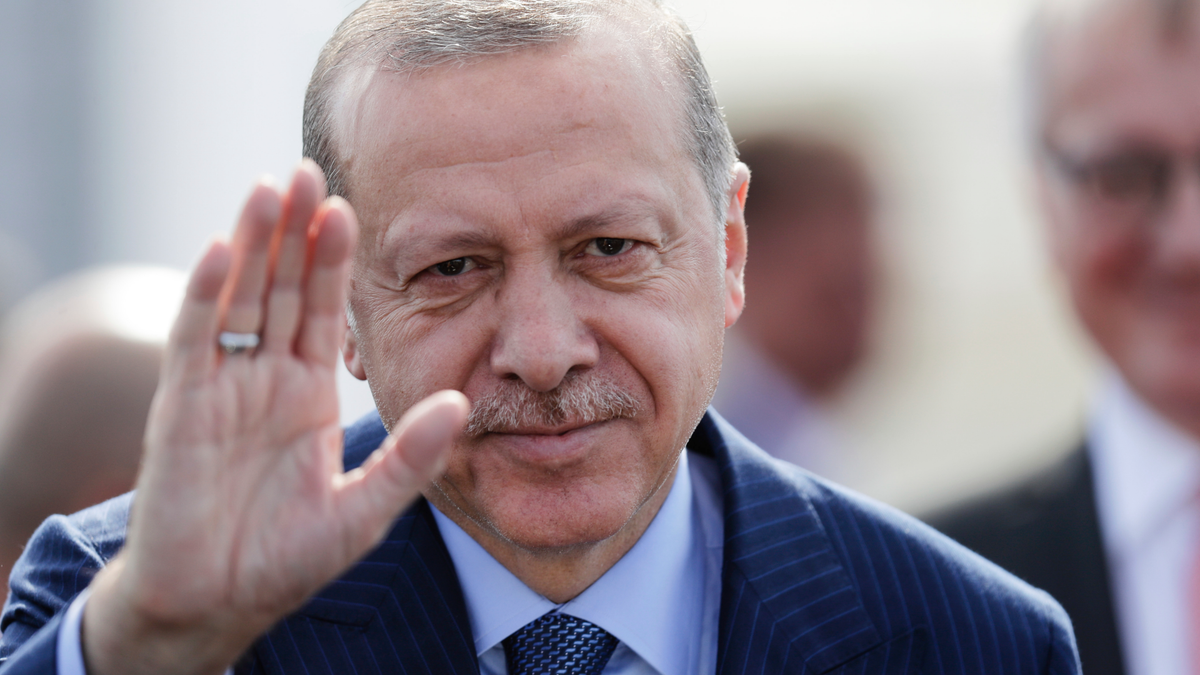
NASA scientist Serkan Golge, a dual Turkish-American citizen, remains behind bars in Turkey. (Fox News)
While the news of Pastor Andrew Brunson’s release from Turkish imprisonment on Friday was warmly welcomed in Washington circles, nearly a dozen more American citizens remain jailed in Turkish prisons in what U.S. have officials have deemed acts of "political hostage-taking."
Among those still behind held is NASA physicist and Houston resident Serkan Golge, a dual Turkish-American citizen who was convicted last year in what were widely perceived as trumped-up charges claiming his association with the organization of Fetullah Gulen, a former political ally of Turkish President Tayyip Erdogan.
The Turkish government claims the Gulen Organization, which it has deemed a terrorist group (FETO), was behind an aborted 2016 coup. In the crackdown that followed, tens of thousands of Turks were rounded up for their alleged membership or support for FETO. However, Gulen staunchly denies he was involved and the U.S. government has said there is insufficient evidence to prove involvement.
Golge, who was also accused of being a CIA operative, was sentenced in February to seven-and-a-half years in prison. He has steadfastly denied being involved in any terrorist activity, or working for the CIA.
“We are all depressed. This has become stupid,” Golge's wife, Kubra, told Fox News in a weekend interview. Kurba Golge and her two sons, aged three and eight, are themselves stuck in Turkey, unable to return to their Houston home because they cannot leave the country.
Kubra cited one positive development in case, which came in September during an appeal hearing, in which the charge of being a FETO member was dropped, and his sentence commuted to five years for "financially aiding" the group. But even those charges have been dismissed by Golge's supporters as fake.
The “new evidence," a frustrated Kubra said, was because the family had an account with Bank Asya, which had thousands of customers and hundreds of branches across Turkey. The bank was shut down in 2015 by Turkish authorities because of its association with Gulen.
Kubra claimed the charges against her husband came after a distant relative, upset over a family land issue, made a false claim to authorities. Despite no evidence, she said, Golge was jailed and convicted.
Gulen, who lives in Pennsylvania, has denied any involvement in the attempted coup. And Turkish requests to force his deportation from the U.S. have been rebuffed by officials for lack of evidence.
But given the Golges are both Turkish-American, the U.S. role is more complex than that of Brunson who is only a U.S. citizen. International law does not allow Golge and other Turkish-Americans the priviliges of U.S. citizenship while they are in Turkey.

Professor Clyde Forsberg, an American professor in Turkey, was among those detained in a post-coup crackdown. (Fox News)
Kubra said a U.S. Embassy representative was present at the recent court hearing. And while she has not heard directly from the State Department since then, other influential figures have taken up Golge's cause.
“Very glad #PastorAndrew Brunson is coming home after more than two years of wrongful detention. Turkey should now free others, including NASA scientist Serkan Golge & U.S. consulate workers,” tweeted Rep. Ed Royce, a California Republican and chairman of the House Foreign Affairs Committee.
The Committee of Human Rights (CHR), an international umbrella organization for science, medical and engineering professionals who are subject to human rights abuses. The CHR declined to comment for this story, citing their mandate to work on cases privately.
The Committee of Concerned Scientists is also championing Golge’s case. “Mr. Trump has achieved the release of North Korean prisoners this year. Last year Mr. Trump achieved the release of the Egyptian-American aid worker, receiving a praise from the CCS," noted Eugene Chudnovsky, co-chair of the committee. "We hope that this work will continue and that cases of detained dual citizens will be pursued with the same vigor as Mr. Brunson’s case."
Golge studied space radiation at NASA, with the goal of making it safer for astronauts at the space station and in support of the U.S. mission to Mars - endeavors cut short by his arrest. His colleagues have called his contributions “world class.”
Alicia Hofler, a friend and former colleague of Golge’s from Old Dominion University in Norfolk, Va., is also advocating for the scientist's release.
“Serkan came to the U.S. to study physics, and then he chose to become a U.S. citizen. He chose to make his contributions to physics in the U.S. to further the U.S.'s contributions to scientific research endeavors,” Hofler said. “He is a law-abiding family man. He is not political. He, his wife, young children have suffered throughout his imprisonment, trials, and sentencing. The U.S. should do what it can to gain his release, so he can return to the U.S. and continue to further the U.S. science effort.”
Beyond Golge, there is concern about other Turkish-Americans, or Turks who worked with Americans, being held in jail. Royce's tweet referenced three Turkish employees who worked at the U.S. Embassy in Ankara who were arrested in January, and remain under house arrest.
Then there is the case Ismail Kul, a Pennsylvania chemistry professor who cannot return to the U.S., despite being an American citizen. Kul, who worked at Widener University and had been living in the U.S. for 25 years, was vacationing in Turkey at the time of the botched coup. He was detained in the crackdown and only released in January, but is not able to leave the country.
"They shouldn’t forget our situation, and they shouldn’t leave us here for much longer, because I am also U.S. citizen," Kul said in a statement to Fox News on Monday. "I am innocent. Our lives are completely turned down, and we are losing our strength and faith for justice, day by day."
The problem for Golge, Kul and others who also have Turkish as well as U.S. citizenship is that “Ankara treats U.S.-Turkish dual citizens differently than U.S. citizens, and for a long time prevented consular access to Serkan Golge,” explained Aykan Erdemir, Senior Fellow at the Foundation for Defense of Democracies. “Erdogan assumes that there would be less reaction in the U.S. to his treatment of dual citizens, and hence would be less likely to make concessions in their cases."
Another American, Clyde Forsberg, considers himself one of the lucky ones who “got out early.” The American professor was detained in Turkey in August 2016, after being accused of “aiding and abetting a terrorist organization.”
“Erdogan is certain to use Brunson’s release to curry favor, at home and abroad, and as proof of his alleged benevolence and altruism, when we should not forget that Brunson was falsely imprisoned and convicted, and then deported,” he told Fox News. “He is one of the lucky ones, too."
Forsberg called on the U.S. to keep pressure on Turkey until "every American in Turkey falsely charged is released and indemnified for their losses. I would demand that the Trump administration and Congress continue to tighten the economic thumbscrews.”

The government of Turkish President Recep Tayyip Erdogan has arrested tens of thousands of Turks and nationals of other countries in a post-coup crackdown. (AP Photo/Markus Schreiber)
Rep. Richard Hudson (R-NC), a member of the U.S. Helsinki Commission whose amendment to urge Pastor Andrew Brunson’s release was adopted as part of the Berlin Declaration at the Organization for Security and Cooperation in Europe (OSCE) Parliamentary Assembly annual session, is also calling for strong action to support Golge and other Turkish-Americans behind bars.
“I applaud President Trump for taking strong action to help secure Pastor Brunson’s freedom,” Rep. Hudson said. “However, I remain concerned with the troubling pattern of human rights abuses and ongoing religious persecution by Turkish authorities. Pastor Brunson was being held as a political hostage and his charges should have been dropped completely.”
Hudson’s amendment mandates the “full restoration of the Constitutional order and the rule of law," in Turkey, "including an independent legal review of all judicial cases involving foreign citizens whose charges and ongoing detention appear politically motivated to create leverage over foreign countries.”
But how exactly to secure the release of those still held isn't clear. A source closely connected to the Brunson case told Fox News that while the pastor's family is elated to have him back, they aren't really sure what did the trick with Turkish authorities.
"I don’t know what specifically worked. We were doing lots of things," the source said. "But POTUS saying ‘let him go’ always should have been enough."
The source noted the story of Jamal Khashoggi, the Washington Post columnist who hasn't been seen since walking into the Saudi consulate in Istanbul, Turkey on Oct. 2, may have been a factor in Brunson's release. Turkish President Tayyip Erdogan and the Turkish leadership have taken a strong stance in investigating the incident, which has sent shockwaves across the international community.
“Turkey’s fear of economic reprisal by the U.S. over Brunson played a large part in his release. It came at a time when Turkey looked strong taking on Saudi Arabia while bowing to U.S. pressure. It was a smart move,” the source continued. “But if time drags on too much, the others will forget about them if they are out of the news.”
The U.S. State Department did not respond to comment on the plight of the remaining Americans. Officials have repeatedly insisted to Fox News in the past that the matter is of paramount importance, and that all diplomatic measures will be exercised in what they consider the unjust detainment and sentencing of Turkish-American citizens.
“If the American public’s attention to Erdogan’s remaining hostages wanes following the release of Pastor Brunson, this not only makes it difficult for other prisoners to receive fair treatment from Turkish courts,” added Erdemir. “But also risks encouraging further hostage taking.”